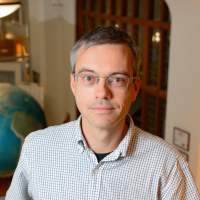This winter, for our seasonal series entitled “Professorship and Mentorship,” PCURs interview a professor from their home department. In these interviews, professors shed light on the role that mentorship has played in their academic trajectory, including their previous experiences as undergraduate and graduate students as well as their current involvement with mentorship as independent work advisers for current Princeton undergraduates. Here, Alec shares his interview.
~~~~~
Princeton takes great pride in its focus on undergraduate independent work, and the expectations of original research and mentorship define the academic experience of juniors and seniors. However, everyone has their own model for mentoring and their own ideas of what undergraduate research should focus on. As part of our Winter Seasonal Series, I interviewed Geosciences Professor Frederik Simons to understand the role of mentorship in his life and share his perspective on undergraduate research at Princeton. I know Frederik from our many conversations in the GEO department and I took his class GEO 422: Data Models and Uncertainty in the Natural Sciences. He is the second reader for my independent work.
Mentorship is a state of mind… You need to get into someone’s mind and understand their perspective. If you see someone who is distressed or struggling, help out a little bit.

What role has mentorship played in your career, and what role does it play in your life now?
I was blessed with mentors throughout my career, a willingness to listen to advice, and the audacity to ignore it. I experienced mentorship in the form of many people looking out for me; it’s essentially about providing opportunity. Mentorship is lifelong; you are still being taken care of by other people whatever you achieve. Now I try to teach undergraduates what I think they should know and connect graduate students with opportunities.
Mentorship is a state of mind. ‘Mentor’ is from the Latin ‘mens’ for mind. You need to get into someone’s mind and understand their perspective. If you see someone who is distressed or struggling, help out a little bit. I have always enjoyed explaining stuff and helping out; it makes me feel good.
Mentorship is exhausting; it means you have to care. I often think that if we expanded our undergraduate [student body], I would be worse at doing my job.
What else do you gain from mentoring students and advising their independent work?
Other than a sense of utility (that I’m not wasting my time on this Earth)… I find it enriching. What I look for is more science, more truth, and more creativity. I find students who know nothing [about the field], or who come with a different perspective, always enriching. I like learning and I learn when I’m teaching. Even the worst students, in terms of it’s not conventionally going well, I always find something enriching and learn something new–even if what I learn is the surprising fact that somebody doesn’t know a certain thing that I thought they would. Then I ask myself: why?
But mentorship is exhausting; it means you have to care. I often think that if we expanded our undergraduate [student body], I would be worse at doing my job. Mentorship is one-on-one. Expanding the student body is great–but then you have to expand the resources.
You don’t need to discover something important and new to follow your curiosity and discover something important and new about yourself.
What changes would you want to see to improve undergraduate independent work or mentorship at Princeton?
My unpopular thought is that… we should not overemphasize the importance of our students doing original research. What I don’t think we should do is, when one curious undergrad says “I’m really interested in this,” we say “that is not original, do something original.” There is great value in rediscovering old ideas. [Undergraduate] research needs to be redefined as following your curiosity. You don’t need to discover something important and new to follow your curiosity and discover something important and new about yourself. If we can guide it into something novel, then great! The best of all worlds is when you get an undergrad who is interested in something [you] don’t know, and the world doesn’t know… But I always tell students, “don’t worry about it, come talk to me and we’ll find something.”
I think students, professors, and the University could gain a lot from considering Frederik’s perspective. He offers a definition of mentorship which emphasizes empathy, effort, and helping others by providing them with opportunities to succeed. And in that sense, we can all be mentors; for each other, for younger students, even for our own professors. He also asks us to reconsider the goal of undergraduate independent research; should we really place the highest value on ‘originality?’ Or could we improve undergraduate education and the quality of independent research experience if we emphasized pursuing curiosity and self-discovery instead?
—Alec Getraer, Natural Sciences Correspondent

